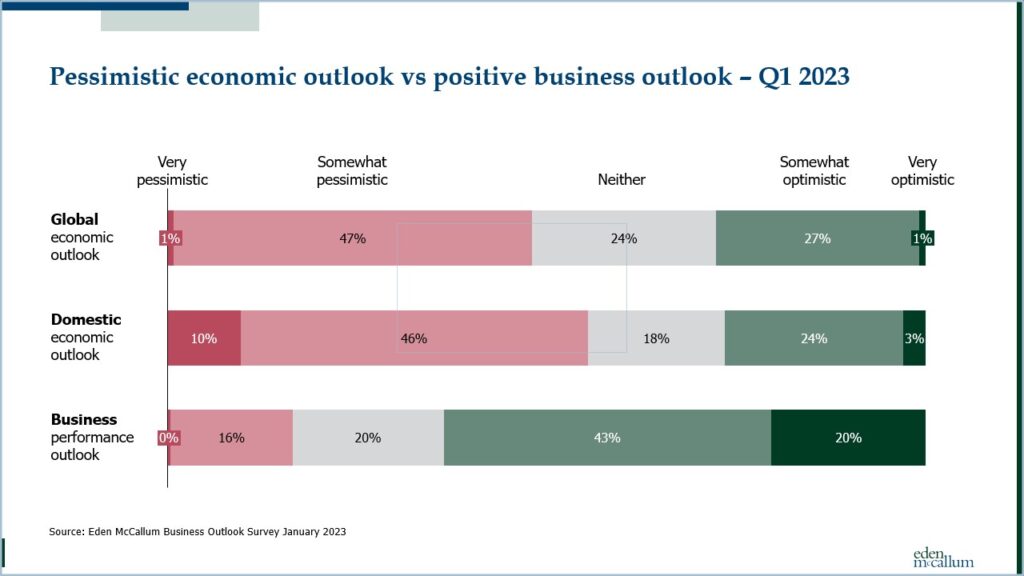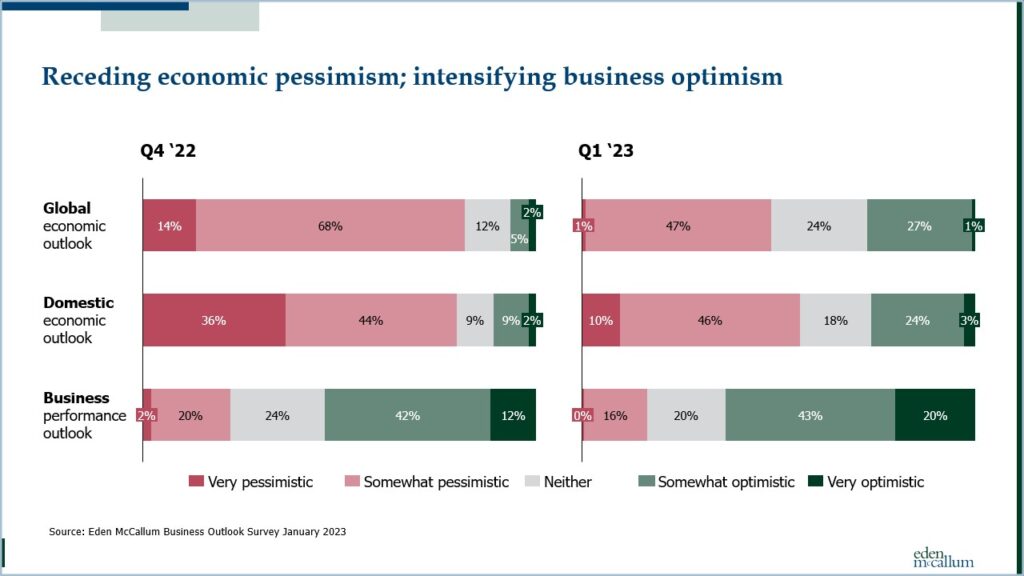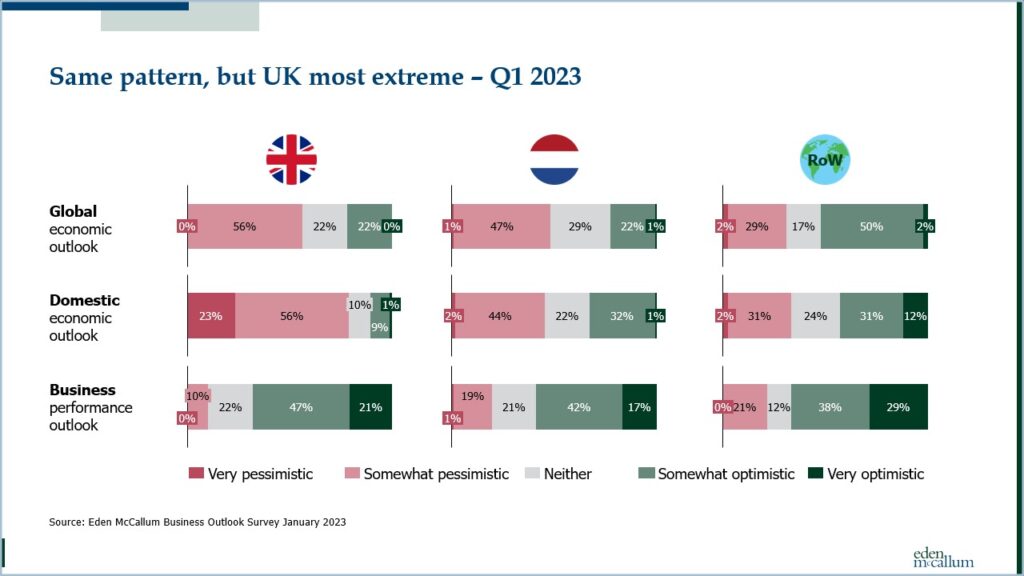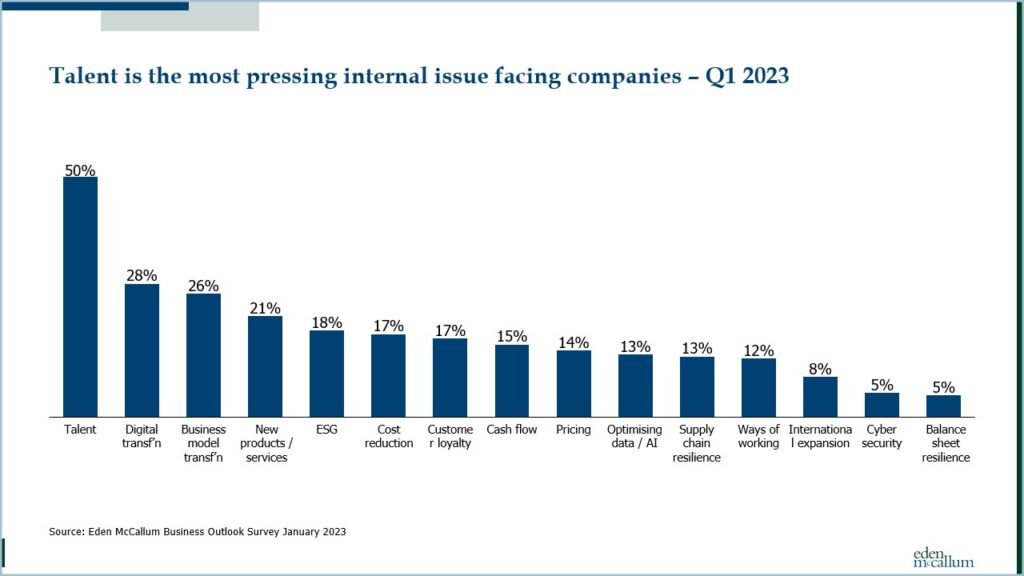Economic and Business Outlook Survey
January 2023
Business leaders have to focus both on their firm’s future prospects but also on the wider economic context. The latest Eden McCallum survey of business sentiment has captured this twin focus neatly. While individual leaders, particularly in the UK, are showing signs of increased optimism about their own businesses, the broader view still sees some serious problems ahead.
We surveyed almost 250 business leaders in the UK, the Netherlands and around the world. While just under half our respondents are pessimistic about the global economic outlook, and over half (56%) are pessimistic about their domestic economy, as many as 63% are optimistic for their own company’s future. This contrast – between the expected global and domestic economic outlook compared with their own company performance – is strongest in the UK, but can be seen in all markets.

Since our last survey in Q4 2022, pessimism about the global and domestic economy has eased and optimism about expected business performance has increased. 48% of respondents are now pessimistic about the global economic outlook, down from 82% in October last year. Similarly, 56% are now pessimistic about the domestic economy, down from 80%. 63% are now optimistic for their own business’s prospects, up from 54%.

Pessimism regarding the global economic outlook has receded over the past quarter, but optimism is not yet at pre-Covid levels. In 2018, for example, 31% of UK respondents were somewhat optimistic, while today’s equivalent figure is 22%. A similar pattern is found among Dutch business leaders.
UK business leaders remain much more pessimistic about their national economic outlook than other business leaders, with 79% still feeling gloomy. This pessimism is at similar levels to the early post-Brexit years (c. 80%). Under half – 46% – of Dutch business leaders share that domestic gloom, and in the rest of the world we found only 33% to be pessimistic about their home market prospects
There are some encouraging signs, however. Leaders individually seem more hopeful about the prospects for their own businesses – around 60% feel optimistic. Business leaders’ optimism about their companies’ expected performance has increased in the last quarter, particularly in the UK, where it is up from 51% to 68%.

Which issues are causing business leaders the most concern as they look ahead at their domestic economies? Inflation (55% mention this), labour shortages (43%) and geopolitical instability (40%) are the most important threats to their domestic economies in the near future. While concern about the impact of labour shortages and domestic politics has risen since the last quarter, worries over geopolitical instability have, for now, fallen significantly (from 73% to 40%).
For all respondents the two top external factors expected to have an impact on company performance are changing consumer demand (38% mention this) and inflation (36%). Worries about inflation, however, have fallen since last October (from 49% to 36% citing this).
The question of talent remains absolutely front of mind for business leaders. Half say that talent (acquisition and retention) is the most pressing internal issue for their companies. This is consistent across all regions and with the findings last quarter.

Dena McCallum, co-founder of Eden McCallum, says the varying findings of this latest survey offer some encouragement for the future. “If we take a glass half full view, there is less pessimism about the economy and more optimism about expected business performance in all regions than there was even a few months ago. But some issues – especially inflation and labour/talent shortages – remain a matter of concern. We are hoping that sentiment continues to improve over the coming quarters, as inflation appears to have peaked.”
To view the full results, please click here.
Follow us on LinkedIn to remain updated.

